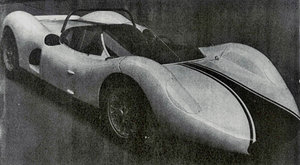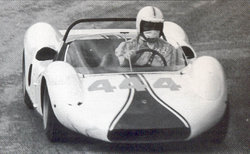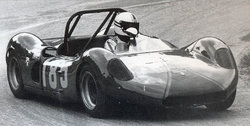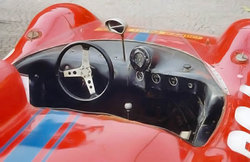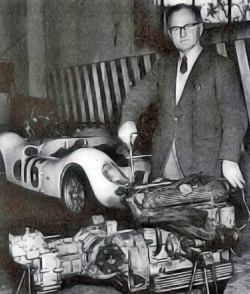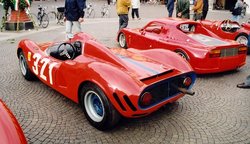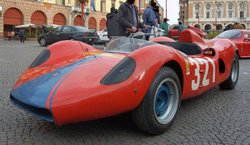Difference between revisions of "Bandini 1000"
m |
|||
| (5 intermediate revisions by the same user not shown) | |||
| Line 1: | Line 1: | ||
{{X}} | {{X}} | ||
| − | [[Image:Bandini1000_66.jpg|300px|thumb| | + | [[Image:Bandini1000_66.jpg|300px|thumb|right]] |
| − | |||
| + | The '''Bandini 1000''' is a race [[car]], built in [[1966]] by [[Bandini|Bandini Cars]] [[Forlì]]. | ||
| − | This new sports prototype, replaces the''[[1000 Bandini P | P 1000]]''which inherits the engine bialbero Bandini of 1000 | + | This new sports prototype, replaces the ''[[1000 Bandini P | P 1000]]'' which inherits the engine bialbero Bandini of 1000 cm³ [[engine displacement]], constantly updated and improved (finally landed at rear), the scheme standstill four-wheel independent and structure of the chassis, which is only tightened with the use of new elements in the same material. With the ''1000/66'' the disc brakes become a constant for the following types, while entirely new for Bandini is the adoption of exchange Colotti five marches and the positioning of the twin radiator that are rear placed. |
[[Image:Bandini_1000_66.jpg|250px|thumb]] | [[Image:Bandini_1000_66.jpg|250px|thumb]] | ||
| − | ===The | + | ===The Chassis=== |
[[Image:Bandini_1000_sp66.jpg|250px|thumb]] | [[Image:Bandini_1000_sp66.jpg|250px|thumb]] | ||
The [[frame]], designed and built by Ilario Bandini, is a development based on experiences gathered by the first motor car rear built. | The [[frame]], designed and built by Ilario Bandini, is a development based on experiences gathered by the first motor car rear built. | ||
| − | The''1000/66''is the car with which it is metabolized and exploited change | + | The ''1000/66'' is the car with which it is metabolized and exploited change |
happened with the''1000''P, [[1962]] in this vein is considered the change in the distribution of weights and geometry of suspensions that resulted in new mergers of portamozzi. | happened with the''1000''P, [[1962]] in this vein is considered the change in the distribution of weights and geometry of suspensions that resulted in new mergers of portamozzi. | ||
| − | * Structure and [[material]]: | + | * Structure and [[material]]: frame of elliptical section tubes, special steel aeronautics derivation; patent No. 499843 |
* [[Suspension (mechanical) | Suspensions]]: | * [[Suspension (mechanical) | Suspensions]]: | ||
** Front: Independent, triangles overlapping with [[shock]] hydraulic telescopic tilted and [[spring | springs]] cylindrical helical coaxial; bar Account | ** Front: Independent, triangles overlapping with [[shock]] hydraulic telescopic tilted and [[spring | springs]] cylindrical helical coaxial; bar Account | ||
| − | ** Rear: independent, arms swinging and triangles lower [[shock]] hydraulic telescopic inclined agents on portamozzi and [[spring | springs]] cylindrical helical coaxial, [[camber]] caster and | + | ** Rear: independent, arms swinging and triangles lower [[shock]] hydraulic telescopic inclined agents on portamozzi and [[spring | springs]] cylindrical helical coaxial, [[camber]] caster and Toe adjustable bar Account |
| − | [[Image: Sp2_003x.jpg | 250px | thumb]] | + | [[Image:Sp2_003x.jpg|250px|thumb]] |
* [[Brake | Braking system]]: | * [[Brake | Braking system]]: | ||
** Service: hydraulic disc front and rear Amadori | ** Service: hydraulic disc front and rear Amadori | ||
| Line 37: | Line 37: | ||
* Positioning: longitudinal rear, 4-cylinder in-line | * Positioning: longitudinal rear, 4-cylinder in-line | ||
| − | * Materials and specifics: a mixed distribution: chain gears, on casters double [[camshaft]] [[tested (mechanical) | head]] alloy [[aluminium]], 8 valves, chamber burst hemisphere, | + | * Materials and specifics: a mixed distribution: chain gears, on casters double [[camshaft]] [[tested (mechanical) | head]] alloy [[aluminium]], 8 valves, chamber burst hemisphere, block and [[base]] to five [[media bench]] unique fusion of aluminium, sump in [[aluminium alloys | Light]], reeds of cylinders in [[iron]] chrome and detachable |
* [[Bore]]: 68 [[mm]] | * [[Bore]]: 68 [[mm]] | ||
| − | * [[Running (mechanical) | | + | * [[Running (mechanical) | Stroke]]: 68 [[mm]] |
| − | * [[ | + | * [[Displacement]]: 987 cm ³ |
* Compression ratio: 9,5:1 | * Compression ratio: 9,5:1 | ||
* [[Power]]: 2 Weber carburetors double body 38DCO3 | * [[Power]]: 2 Weber carburetors double body 38DCO3 | ||
| Line 46: | Line 46: | ||
* Lubricate: [[Carter]] with wet gear pump and filter external | * Lubricate: [[Carter]] with wet gear pump and filter external | ||
* Cooling: forced liquid with centrifugal pump-driven belt and pulley, 2 aluminum radiators to rear | * Cooling: forced liquid with centrifugal pump-driven belt and pulley, 2 aluminum radiators to rear | ||
| − | * [[Exchange (mechanical) | | + | * [[Exchange (mechanical) | Gearbox]] and clutch: 5 speed + RG clutch dry disc |
* Ignition and electrical equipment: coil and [[spinterogeno | distributor switch]] on the head, battery 12 [[V]] and [[generator]] | * Ignition and electrical equipment: coil and [[spinterogeno | distributor switch]] on the head, battery 12 [[V]] and [[generator]] | ||
| Line 54: | Line 54: | ||
| − | The two-seater sports car (boat) is implemented fully by Bandini [[aluminium]]. Extremely low, especially to the goalkeeper, is softly lies on the chassis highlighting the wheels; ray Borrani initially and later in [[aluminium alloys | Light]] Amadori. The air-intake front, close and rounded side is purely aesthetic and are functional the four big air behind the rear wheel that open just behind the cockpit well protected by screens in [[Plexiglas]]. | + | The two-seater sports car (boat) is implemented fully by Bandini in [[aluminium]]. Extremely low, especially to the goalkeeper, is softly lies on the chassis highlighting the wheels; ray Borrani initially and later in [[aluminium alloys | Light]] Amadori. The air-intake front, close and rounded side is purely aesthetic and are functional the four big air behind the rear wheel that open just behind the cockpit well protected by screens in [[Plexiglas]]. |
The rear, is interrupted by a sharp vertical cut that originates a large oval opening to whose ends are the round headlights rear. More small openings tilted, the same form of that great earlier, highlight the shape of the rear wheel giving consistency to the whole body. | The rear, is interrupted by a sharp vertical cut that originates a large oval opening to whose ends are the round headlights rear. More small openings tilted, the same form of that great earlier, highlight the shape of the rear wheel giving consistency to the whole body. | ||
Over the years, has been amended several times the roll-bar in the most recent version is hidden by a long fin and rounded longitudinal with the addition of head-rests. | Over the years, has been amended several times the roll-bar in the most recent version is hidden by a long fin and rounded longitudinal with the addition of head-rests. | ||
| Line 60: | Line 60: | ||
Today is exposed to the museum town [[Forlì]]. | Today is exposed to the museum town [[Forlì]]. | ||
| − | == == | + | == Related Items== |
| − | * [[Bandini Cars]] | + | * [[Bandini|Bandini Cars]] |
* [[Ilario Bandini]] | * [[Ilario Bandini]] | ||
| − | |||
| − | |||
| − | |||
| − | |||
| − | |||
| − | |||
| − | |||
| − | |||
| − | |||
{{Bandini}} | {{Bandini}} | ||
Latest revision as of 21:30, 23 September 2009
The Bandini 1000 is a race car, built in 1966 by Bandini Cars Forlì.
This new sports prototype, replaces the P 1000 which inherits the engine bialbero Bandini of 1000 cm³ engine displacement, constantly updated and improved (finally landed at rear), the scheme standstill four-wheel independent and structure of the chassis, which is only tightened with the use of new elements in the same material. With the 1000/66 the disc brakes become a constant for the following types, while entirely new for Bandini is the adoption of exchange Colotti five marches and the positioning of the twin radiator that are rear placed.
The Chassis
The frame, designed and built by Ilario Bandini, is a development based on experiences gathered by the first motor car rear built. The 1000/66 is the car with which it is metabolized and exploited change happened with the1000P, 1962 in this vein is considered the change in the distribution of weights and geometry of suspensions that resulted in new mergers of portamozzi.
- Structure and material: frame of elliptical section tubes, special steel aeronautics derivation; patent No. 499843
- Suspensions:
- Front: Independent, triangles overlapping with shock hydraulic telescopic tilted and springs cylindrical helical coaxial; bar Account
- Rear: independent, arms swinging and triangles lower shock hydraulic telescopic inclined agents on portamozzi and springs cylindrical helical coaxial, camber caster and Toe adjustable bar Account
- Braking system:
- Service: hydraulic disc front and rear Amadori
- Steering: a rack and pinion
- Guide: left
- Wheels: ray Borrani then Light Amadori
- Tank: 45 Litres
- Transmission: differential and return rear Colotti
- Weight total: 400 kg
Engine Bandini Bialbero 1000
- Positioning: longitudinal rear, 4-cylinder in-line
- Materials and specifics: a mixed distribution: chain gears, on casters double camshaft head alloy aluminium, 8 valves, chamber burst hemisphere, block and base to five media bench unique fusion of aluminium, sump in Light, reeds of cylinders in iron chrome and detachable
- Bore: 68 mm
- Stroke: 68 mm
- Displacement: 987 cm ³
- Compression ratio: 9,5:1
- Power: 2 Weber carburetors double body 38DCO3
- Power: 105 CV @ 8500 rpm
- Lubricate: Carter with wet gear pump and filter external
- Cooling: forced liquid with centrifugal pump-driven belt and pulley, 2 aluminum radiators to rear
- Gearbox and clutch: 5 speed + RG clutch dry disc
- Ignition and electrical equipment: coil and distributor switch on the head, battery 12 V and generator
The Body
The two-seater sports car (boat) is implemented fully by Bandini in aluminium. Extremely low, especially to the goalkeeper, is softly lies on the chassis highlighting the wheels; ray Borrani initially and later in Light Amadori. The air-intake front, close and rounded side is purely aesthetic and are functional the four big air behind the rear wheel that open just behind the cockpit well protected by screens in Plexiglas.
The rear, is interrupted by a sharp vertical cut that originates a large oval opening to whose ends are the round headlights rear. More small openings tilted, the same form of that great earlier, highlight the shape of the rear wheel giving consistency to the whole body.
Over the years, has been amended several times the roll-bar in the most recent version is hidden by a long fin and rounded longitudinal with the addition of head-rests.
The original white livery and red was replaced at the end of the year 1971 with the current red and blue.
Today is exposed to the museum town Forlì.
Related Items
| Bandini Automobili | |
|---|---|
| Barchette: "La prima" 1100/46 | 1100 sport | 1100 Siluro (Torpedo) | Bandini-Maserati 1500 | 750 sport Siluro (Torpedo) | 750 sport internazionale "saponetta"
Formula: Formula 3 | Formula junior
|
